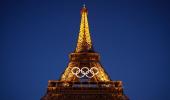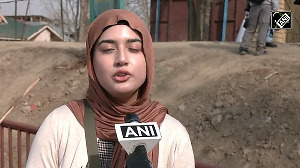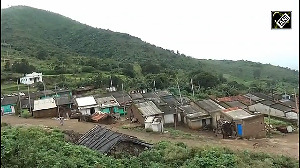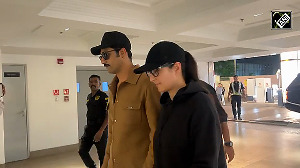At least 488 Ukrainian athletes and trainers have been killed since early 2022, around two dozen of whom had been European or world champions in their discipline, according to sports ministry spokesman Serhiy Bykov.

When Stanislav Hulenkov signed up for Ukraine's border guard in 2021, he sought a stable job on the quiet northwestern frontier so he could continue his career as a rising judo star.
Two years later, the 22-year-old disappeared on an artillery-scarred battlefield on the other side of the country. Hulenkov's remains were identified 10 months after that, making him one of hundreds of Ukrainian athletes killed in Russia's full-scale invasion.
Ahead of the Summer Olympics which open in Paris this week, Ukraine is mourning athletes like Hulenkov whose sporting promise was cut short by the war, now grinding towards its 30th month.
"He was the kind of child who always had plans," said his mother, Iryna Hulenkova, speaking outside the gym where her son trained as a child in the picturesque western city of Lutsk. "He knew what would happen tomorrow, and the day after tomorrow."
At least 488 Ukrainian athletes and trainers have been killed since early 2022, around two dozen of whom had been European or world champions in their discipline, according to sports ministry spokesman Serhiy Bykov.

Weightlifter Oleksandr Pielieshenko, who finished fourth in his weight class at the 2016 Summer Games, became the latest prominent sporting casualty when he was killed in eastern Ukraine on May 5 aged 30.
The two-time European Champion had joined the military in the first months of Moscow's invasion - his second direct experience of war after he fled the eastern Luhansk region in 2014 after Russia sparked a separatist insurgency there.
"Sports were always his life, and he always wanted to return," she told Reuters.
Despite earlier threats to boycott the Games, Kyiv is sending 140 athletes and 95 coaches, a smaller delegation than in peacetime.
Back home, they trained amid regular Russian air strikes that have ravaged critical infrastructure and plunged cities across Ukraine into darkness.

Athletes from Russia and Belarus, which allowed Moscow to use its territory to launch its February 2022 invasion, are participating in the Games only as neutrals, barred from singing anthems or displaying flags and emblems.
Ukrainian sports authorities in May released recommendations for its athletes on avoiding contact with competitors from the two neighbouring countries.
Hulenkov had been a judo standout for years in Lutsk, near the Polish border. He was a silver medallist at the Ukrainian under-18 Championship in 2017 and claimed third at the 2019 Junior European Cup in Cluj-Napoca, among other honours.
"He was very talented, and he had his own kind of technique," said Vadym Chernov, a close friend and judo partner, who dedicated his bronze medal at the European Open in Tallinn earlier this month to Hulenkov, posting a photograph on Instagram holding up his friend's judo name tag.

Before the war, Hulenkov had been competing for a spot on Ukraine's national team. That goal seemed within reach until he was sent to patrol the Belarusian border after the invasion. Early last year he was dispatched to the battle zone in eastern Ukraine.
Chernov told Reuters he had tried to convince Hulenkov to apply for leave from the military to attend the Ukraine Cup, which was held in early May, 2023. Hulenkov refused, and went missing just weeks before the tournament, on April 19 last year.
"He told me, 'I can't leave my brothers'," Chernov said, adding that he now carries Hulenkov's name tag with him to judo events.
"For me, it's a reminder that he's always...travelling with me to competitions."













 © 2025
© 2025